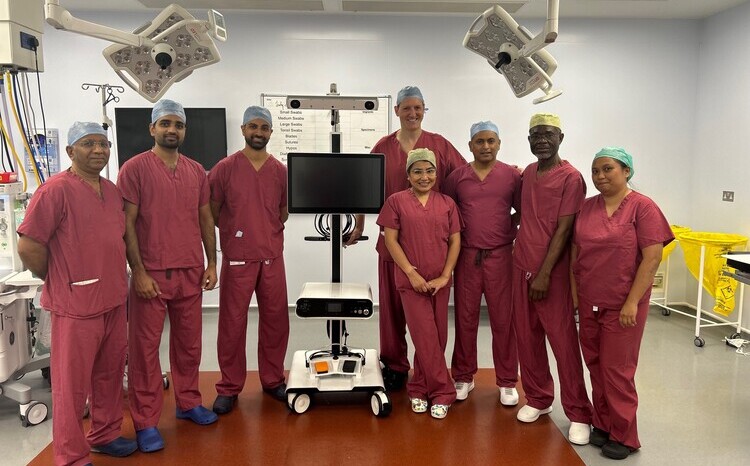Government pledges £32m for transformative health technology projects
- 9 September 2020

The government has announced a £32 million investment in six health technology research projects that aim to transform the NHS by 2050.
The projects range from an AI x-ray scanner to diagnose cancer more quickly and robotic muscles to assist those recovering from a stroke.
Science minister Amanda Solloway announced the funding as part of her keynote speech at London Tech Week 2020 on 7 September.
“The pioneering projects we are backing today will help modernise healthcare, improving all of our lives now and into the future,” she said.
“Today’s announcement is part of our ambitious R&D Roadmap and underlines our commitment to back our incredible scientists and researchers and invest in ground-breaking research to keep the UK ahead in cutting-edge discoveries.”
InlightenUs, led by the University of Edinburgh, will receive £5.4 million to use a combination of artificial intelligence and infra-red lasers to produce fast, high resolution 3D medical images, helping to identify diseases in patients more quickly.
Working with the universities of Nottingham and Southampton, the new research will initially be developed for use on hospital wards and GP surgeries.
By 2050 researchers are aiming to scale up to walk-through airport style X-Ray scanners, which will be able to pick up detailed images of structures often hidden within the human body that can reveal tumours.
Another of the six projects, empower, led by researchers at the University of Bristol, and will receive £6 million to develop artificial robotic muscular assistance to help restore strength in people who have lost muscle capability.
This could include patients who have suffered a stroke or are living with degenerative diseases such as sarcopenia and muscular dystrophy.
Innovation minister Lord Bethell added: “Throughout this global pandemic, the NHS has continued to be there for us all and to treat cancer patients and those living with chronic illness as a priority.
“These pioneering new projects will help us further improve care for patients and make life easier for NHS staff, cementing the UK’s status as a world leader in research and technology and ultimately saving thousands of lives.”
The funding is being delivered through the Engineering and Physical Sciences Research Council (EPSRC), part of UK Research and Innovation, through the Transformative Healthcare Technologies for 2050 call.
It comes after the government announced a £50m for further investment in artificial intelligence to improve diagnostics across the NHS.
Other projects to receive funding include:
- Non-invasive single neuron electrical monitoring (NISNEM): led by Imperial College London, it will receive £5.5 million to develop a non-invasive single neuron electrical monitoring technology, which when combined with AI will allow researchers to monitor the brain in a way never achieved before. This will help scientists gain a better understanding of neurological diseases such as Parkinson’s and Alzheimer’s.
- COG-MHEAR: Towards cognitively inspired 5G-Internet of Things enabled, multi-modal hearing aids: led by Edinburgh Napier University, it will receive £3.2 million, to develop hearing aids designed to autonomously adapt to the nature and quality of their surroundings.
- Quantum imaging for monitoring of wellbeing and disease in communities: led by the University of Glasgow, it will receive £5.5 million to develop a project which aims to create a home of the future, providing homeowners with feedback on their health and wellbeing.
- U-care: led by Heriot-Watt University, in partnership with the universities of Bath and Edinburgh, it will receive £6.1 million to exploit new laser, optical fibre and imaging technologies, delivering therapy for bacterial diseases and viruses in confined regions of the body such as the lungs, catheters inserted into the body for prolonged periods and areas of the body that have been subject to surgical procedures.




